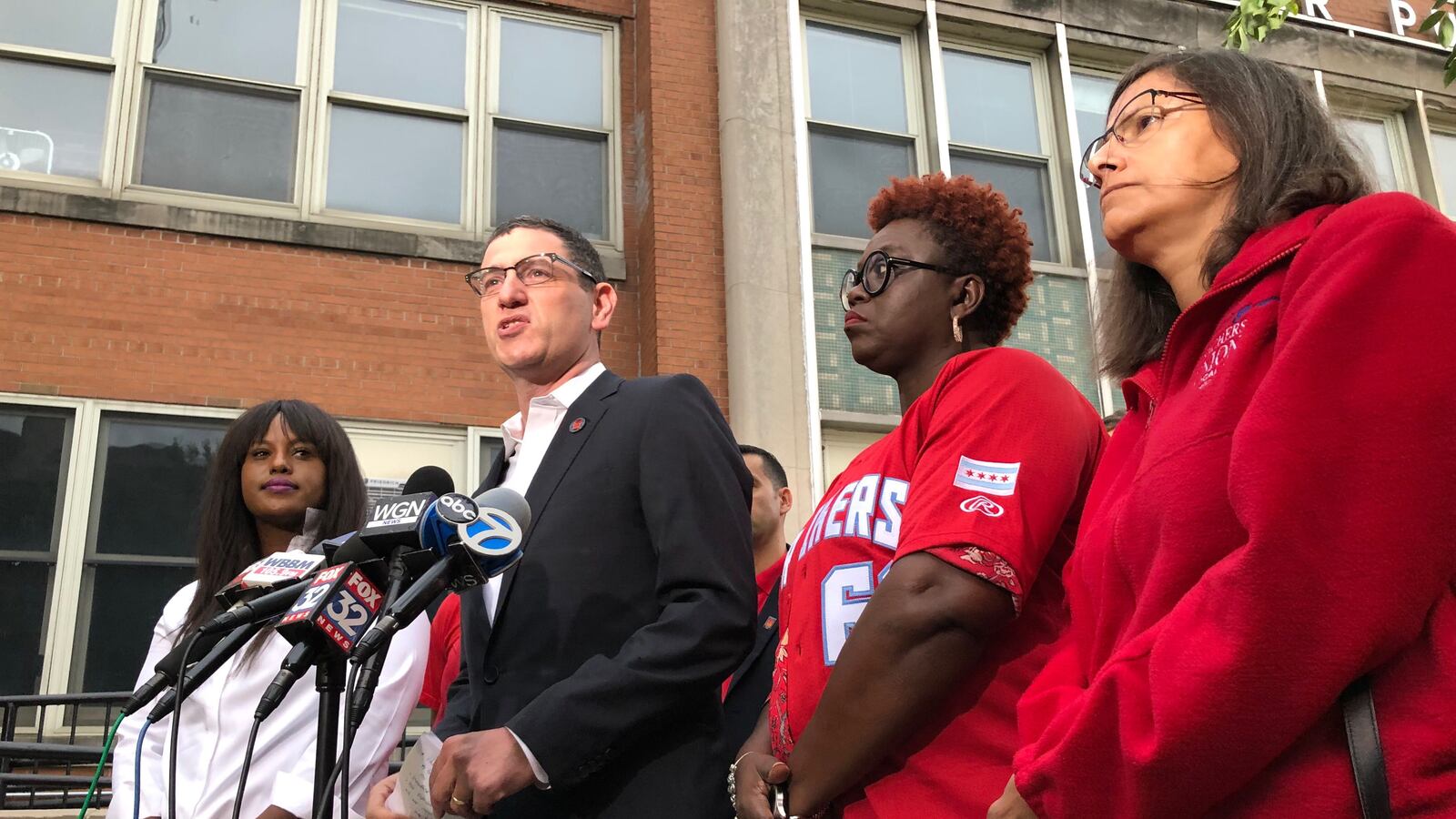The Chicago Teachers Union early Monday formally rejected a neutral fact-finder’s report calling for wage and health benefits primarily on the city’s terms and thus started a countdown toward a Sept. 26 teachers strike, the earliest possible date teachers could legally walk out.
The union’s next step will be for its House of Delegates representative body to set a date for a strike authorization vote. Its next meeting is Sept. 4.
The fact-finder, Steven Bierig, officially released his report to the public on Monday, although a summary of his conclusions was leaked to WTTW-Channel 11 earlier this month. The report recommends a 16% cost-of-living raise for teachers over five years, and proposed the district not increase health care contributions for teachers for the next two years, but then raise them a quarter of a percent each in years three and four, and half a percent in year five.
At back-to-back press conferences Monday — one week before Chicago students return to school — the district and the union each laid out their own arguments on what it would take to close the deal.
The city accepted Beirig’s recommendations at its press conference at Webster Elementary School on the city’s West Side, and Chicago Mayor Lori Lightfoot said she would up her offer to the 16% advised in the report at a total cost of $351 million across five years.
“That’s real money on the table, folks,” the mayor said.
Until now, she had been offering a 14% raise over five years.
The proposed bump means that the average teacher would see a salary increase of 24%, including the scheduled salary increases that teachers receive based on years of service, Lightfoot’s team said.
But the union, rejecting the fact-finder’s proposals at an event at outside Suder Montessori School on the Near West Side, said that while Lightfoot’s pay proposals were couched as generous, teachers have faced a decade of wage stagnation that included furloughs and pay freezes.
“In Chicago, educators in our classroom have been disrespected, where conditions in our classrooms have deteriorated, where we feel like there have been cuts after cuts,” union President Jesse Sharkey said.
Sharkey added that the union would not strike a deal without contractual promises on increased staff positions in special education, more aides, and smaller class sizes.
The two narratives reveal a key area of disagreement over how investments should be made in Chicago schools. The city said it has promised staffing boosts and investments in neighborhood schools — and those investments are reflected in the 2019-20 budget plan it made public in August. The school board will vote on the plan Wednesday.
The mayor has said she will fund hundreds of new social workers, special education case managers and nurses at district schools over the next five years, and claimed that a majority of these positions are reflected in the district’s 2019-20 budget proposal.
The union has criticized that proposal for falling short in filling in gaps in support staff. It wants the district to hire nearly 5,000 additional teachers, professionals and aides, at a cost of $880 million over three years.
“What we have seen in the budget is a pitiful shadow of what the promises sound like,” Sharkey said. “It’s not adequate.”
Bierig said in his report that staffing is outside of the fact-finder’s scope.
The union is legally limited to bargaining only on issues that address core teaching conditions, such as pay and benefits. That means the union can’t legally walk out over staffing issues.
But at Monday’s press conference, Sharkey argued that the mayor had made a political commitment to better invest in equity in schools, and the union wants them in writing.
“We see all these issues as being connected … as part of the overall package our union will accept,” he said. “It’s a lot harder to work in a school where, if two or three teachers call out sick, special education teachers are being pulled from their work to cover classes.”
Lightfoot also has proposed adding $73 million to schools sites next year, several initiatives to boost neighborhood schools, a$12 million boost for bilingual education, and equity grants to help small schools.
After the union sets a date for a strike authorization vote, its 25,000-plus members will have a chance to vote for or against a strike. In order for teachers to walk out, a state law passed during former Mayor Rahm Emanuel’s tenure requires that at least 75% of union membership must vote in favor of a strike.
Lightfoot, who has said in recent weeks that the city faces a bigger-than-expected financial hole, plans to give her first budget address as mayor on Thursday. Last week, City Hall announced a hiring freeze. But while financials look tight, Lightfoot said Monday she had no concerns about paying for her contract proposals.
“We are not going to agree to a contract for which we don’t have the resources,” she said.
Meanwhile, negotiators are bargaining several times a week, with a session set for Monday.
Lightfoot has said she hopes the two sides will resolve differences before school starts next week.
The union, meanwhile, has said that until it sees its key demands in a contract, its teachers will continue preparing for a strike.
Find the full text of the fact-finder’s report and the responses from the union and City Hall below.
Here is City Hall’s response.
Here is the Chicago Teachers Union response.

